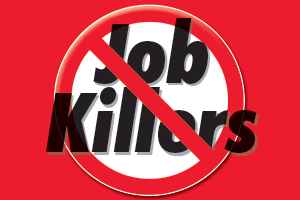The ability of Californians to respond to challenges with imagination and innovation was a recurring theme in remarks at the 90th Annual Sacramento Host Breakfast yesterday.
Governor Edmund G. Brown Jr., California Chamber of Commerce Chair Joseph M. Otting and Sacramento Kings owner Vivek Ranadivé told stories of inspiration from the past and plans for the future. The Governor called out Californians’ destiny to “overcome the obstacles by imagination, by grit, by will, and by collaboration.”
Governor Brown
Governor Brown began his address by reading newspaper headlines declaring California a doomed or failed state.
“That doesn’t seem to be the mood in this room and that isn’t really the mood of California,” Brown said. “Yes we have our challenges, and I don’t want to sugar coat with all the exuberance, the darker shadows that confront our state and our lives and our world, but it is good to recount how far we’ve come.”
What was a $27 billion deficit is now a surplus, the Governor said, but warning “a surplus, by the way that will turn into a deficit without very strong budget discipline over the next couple of years.”
Continuing that theme, he said: “When you spend today, you’re paving the way for massive cuts tomorrow. The better path is stable, careful, sustainable budgeting, and that’s what we are going to have in the state of California.”
California is the seventh, not the eighth largest economy in the world, Brown beamed. “And by the way, we don’t really compete with Texas and New York. No, we’re competing with, the UK and Germany. And we are ahead of India, Russia, Italy and Brazil.”
California is in this position, the Governor told breakfast attendees, only because “people like you invest, build and take risk. And that’s what our government is going to continue to support against enemies, foreign and domestic.”
Brown highlighted several policy areas.
He touched on education and the increased per student funding (up $3,000). The Governor’s budget proposal gives top priority to education, with K–14 school spending pegged to grow by $9.5 billion over two years, or 16% as proposed in the Governor’s budget.
Turning to the drought, Brown commented that the Proposition 1 water bond approved by voters and the Legislature will enable the state to invest in needed water infrastructure. “It’s the first investment in water storage, probably since my father was around,” Brown joked.
The groundwater legislation enacted last year provides for the management for the first time of water taken up in wells, the Governor commented.
The controversial Delta water conveyance project, Brown said, is part of the “highly engineered” water system in Northern California that includes berms , levees and dams for flood protection, channels and the aqueduct for taking water from the snow and the mountains to urban areas.
If the Delta levees failed in an earthquake, salt water would rush in and cut off water to Silicon Valley, causing hundreds of billions of dollars in economic losses. “So think if it as an insurance policy to continue the very sophisticated engineering that has characterized California.”
Brown talked about his executive order to establish a California greenhouse gas reduction target of 40 percent below 1990 levels by 2030—the most aggressive benchmark enacted by any government in North America to reduce carbon emissions over the next decade and a half.
Brown also signed the recent dozen-state agreement, called the “Under 2 MOU,” which provides a template for the world’s nations to follow as work continues toward an international agreement to reduce greenhouse gas emissions ahead of this year’s United Nations Climate Change Conference in Paris.
“California is a world state and we’re acting that way, because we know we can’t do it alone. If we do everything right, it won’t make any difference unless China, India and Brazil and other countries do the same,” the Governor told Host Breakfast attendees.
The Governor discussed his proposal for a new refundable tax credit for the working poor—a first-ever Earned Income Tax Credit (EITC) for California. The EITC is very similar to the negative income tax talked about by “Milton Freedman, the great conservative economist,” Brown said.
Working taxpayers with incomes less than $6,850 (with no dependents) or $13,870 (with three or more dependents) would receive a credit of 85% of the federal credit. This would benefit working households, according to the Department of Finance, $460 on average, to a maximum of $2,653. The administration estimates as many as 825,000 families may benefit from this new tax credit.
Finally, Governor Brown also talked about the rainy day fund.
“As it builds up, everybody forgets the recession and they want to start spending. And right in the middle of all that, we get a crash,” he said. “If we have a modest recession—not if, when we have a rescission, if it’s modest, the California state budget will lose $40 billion over three to three-and-a-half years.”
If you look at how the budget is structured, “just about all the money we’ve gotten over the last few years is going to schools or into the rainy day fund. Now that’s what you call investing in the future. It’s the kids and the stability of our state budget and I think that’s money well spent.”
Joseph Otting
Joseph Otting, CalChamber Board Chair and president and chief executive officer, OneWest Bank, N.A., spoke about California being home to many innovations and transformations.
Speaking as a banker, he reminded attendees about the vital role A.P. Giannini, founder of the Bank of Italy, which eventually merged with Bank of America, played in the California economy by establishing what we all know as the modern-day banking system, one where “the average person could walk into a bank and have access to capital.”
“When you look at his accomplishments of taking banking down to Main Street America, he was able to help Walt Disney finance his first picture show, which was Snow White,” said Otting. “He was the first who had the vision for the wine industry in the state of California, and provided capital to the wine industry. He bought the bonds and put them on the bank’s balance sheet to finance the Golden Gate Bridge. Three people walked into his office that needed help by the last names of, Kaiser, Hewlett and Packard. And he believed in their transformation of where they were going.”
“How important are banks to California?” Otting asked attendees. There are just under $927 billion loans that are done by banks.
“To a banker, that’s a loan,” Otting said. “But to you sitting in the audience, that’s fulfilling your dream…to buy a home, to buy a car, start a new small business or send one of your kids to school.”
Banks have more than 100,000 jobs in California, Otting said. Nearly $900 million of community reinvestment activities are done in the state by banks.
“We need to invest in California’s future—housing, transportation, business infrastructure. We need to collectively look forward to the California of tomorrow, one that will support innovation and job creation to build a foundation for the future,” Otting said in closing.
Vivek Ranadivé
Ranadivé said Civilization 1.0 began with the agrarian revolution, the age of the artisan; Civilization 2.0 was spawned by the industrial revolution. Today, he said, we are entering Civilization 3.0, an “age of extreme service and extreme innovation.” Much of the change that will be happening soon is going to come from the state of California, he said.




